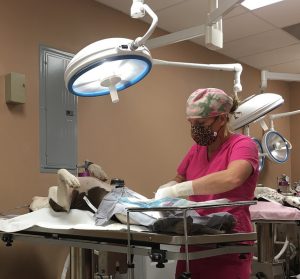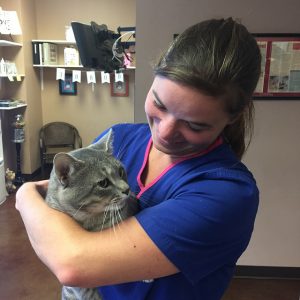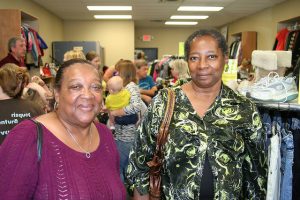Changemakers: Elaine Adair, Mississippi Spay and Neuter

“Through spay/neuter, we can stop cruelty before it starts by preventing births of unwanted puppies and kittens.” — Elaine Adair
Elaine Adair is a founder and Board President for Mississippi Spay and Neuter (MS SPAN) and Vice-President of Operations for The Big Fix Clinic (BFC). She is a gifted coalition-builder in establishing MS SPAN, which has spearheaded animal welfare efforts in Mississippi and is a respected model for serving chronic poverty. Elaine (second to left in this team photo) is also a consultant for nonprofit animal organizations, having mentored spay/neuter programs, referral services, and coalitions throughout the nation. Her comprehensive skill set, education, and compassion have led her to be an outstanding leader in animal welfare. Her expertise spans over 20 years of professional service with the United States Air Force, Lockheed Martin Corporation, and the Air National Guard and is further bolstered by a master’s degree in Technical and Professional Communication. She and her husband live in Gulfport, Mississippi with their precious pets and former strays (2 dogs and 19 cats), who all survived the wrath of Hurricane Katrina in 2005.
In December 2015, United Spay Alliance asked Elaine to interweave the story of MS SPAN with her personal commitment to animals.
USA: How did you become involved in working to help animals?
I started as a volunteer with the Humane Society of South Mississippi (HSSM) in 1999, when I was a field representative for Lockheed Martin with the Hurricane Hunters. I really love animals and decided to focus on them after volunteering with a suicide hotline in Colorado. As I grew older, I became more driven and engaged in the animal welfare movement, and I realized things weren’t right in how we treat animals. My consciousness was so raised, I applied my true passion to help animals by walking the walk. After moving back to Mississippi, we founded a spay/neuter group in 2002 called Mississippi Alliance for Spay and Neuter to address overpopulation and the related suffering and deaths of cats and dogs. This was later incorporated into MS SPAN.
USA: Congratulations on your recent 10-year anniversary! How did MS SPAN get started? Who coined “The Big Fix”?
In 2004, animal advocate Esther Mechler of Marian’s Dream approached Marilyn David and me about starting a statewide spay/neuter organization. Mississippi Spay and Neuter became a nonprofit in August 2005, despite the turmoil of Hurricane Katrina. Humane Alliance built and deployed The Big Fix Rig throughout Mississippi and Louisiana after Hurricane Katrina. The Rig was a large, modern mobile service that delivered high-volume, high-quality spay/neuter in areas with little or no access to affordable surgeries. After The Big Fix Rig left in 2008, we decided to call our new stationary facility The Big Fix Clinic, so we could keep the name recognition we had built since early 2006.
USA: Whom does MS SPAN serve?
The hardworking MS SPAN team provides services to 82% of the population in 42 counties, with ou r three delivery systems: The Bix Fix Clinic, targeted vouchers, and transport programs. The Big Fix Clinic is a 1,500 square foot facility, and our veterinarians, who work a 4-day week, serve up to 50 cats and dogs (mostly cats) a day in spay/neuter. Our fourth delivery service is a referral program that refers pet owners to the other three high-volume clinics, as well as to other voucher programs across Mississippi. We mainly provide affordable spay/neuter services to the public.
r three delivery systems: The Bix Fix Clinic, targeted vouchers, and transport programs. The Big Fix Clinic is a 1,500 square foot facility, and our veterinarians, who work a 4-day week, serve up to 50 cats and dogs (mostly cats) a day in spay/neuter. Our fourth delivery service is a referral program that refers pet owners to the other three high-volume clinics, as well as to other voucher programs across Mississippi. We mainly provide affordable spay/neuter services to the public.
USA: Could you describe three of MS SPAN’s most successful accomplishments or practices.
First, having the financial support of The Edwin E. and Ruby C. Morgan Foundation for The Big Fix Clinic allows us to provide spay/neuter services so that no pet owner is turned away because they can’t afford to pay. They pay what they can, and caretakers pay only $10 for feral cats, which covers the rabies fee. Second, our transport program, started in 2013, provides access to our services for pet owners who live in underserved communities. For example, Lauderdale, Pike, and Warren counties and those within commuting distance, which includes residents in bordering Louisiana and Alabama. And third, Big Thrift is an innovative and fun way to wean ourselves from depending on grants from traditional animal welfare organizations. It really engages the community in helping raise funds for both MS SPAN’s delivery systems – The Big Fix Clinic and targeted voucher program – and the Mississippi Animal Rescue League (MARL) mission. People can either make donations to or purchase from the Big Thrift. MS SPAN and MARL are partners in the Big Thrift and we share the same mission: to end euthanasia of healthy dogs and cats.
USA: What are your three greatest challenges?
I would say apathy or the lack of awareness about our services, then staffing and messaging. Initially, a limited demand for our services resulted in fewer than 4,000 surgeries a year. But in 2014, we performed 5,305 and surpassed that with 5,871 in 2015. I think we’re overcoming apathy through our growing Facebook community, using mailings, and having the Big Thrift and community partnerships. For staffing, we finally have a strong and happy team! Our days go smoother and they end on time. It has taken time and patience to recruit and reward good employees for both The Big Fix Clinic and Big Thrift. Getting our message out has been more successful with our new website, blog, and electronic appeals. I think that’s probably because we have put a face on our appeals, such as cruelty in the case of the Burning Cat Fund. Prevention is easier to market now that we have an active Facebook page with 4,397 followers and growing! We also have access to the 70,000 Facebook followers of our Big Thrift partner, Mississippi Animal Rescue League.
 USA: How many spay/neuter procedures has MS SPAN accomplished to date?
USA: How many spay/neuter procedures has MS SPAN accomplished to date?
Over 30,000 through The Big Fix Clinic and over 30,000 through the voucher program (Big Fix and Little Fix Rigs). That totals more than 60,000 surgeries since 2005.
USA: How many litters would you say this has prevented?
A pair of cats and their offspring can produce 420,000 cats in 7 years. And a pair of dogs and their puppies can produce 67,000 dogs in 6 years. So, saying that we’ve certainly prevented millions of litters of puppies and kittens would be conservative.
USA: Can you indicate how MS SPAN’s work has impacted shelter intakes?
Mississippi Animal Rescue League has dropped shelter intake from 17,000 in 2006 to 13,000 in 2014. And I believe the numbers to be tallied for 2015 will be even less than in 2014.
USA: You have very innovative and proactive programs to help prevent cruelty through spay/neuter. Tell us about the provocatively named Burning Cat Fund.
 A major challenge we have to ending pet overpopulation — and preventing related cruelty — is reaching people who most need our services. Sometimes, we see tensions and cruelty arise in neighborhoods where unaltered stray cats continually breed in our warmer Southern climate. When a woman burned a cat alive and shared her horrific act on Facebook, we knew we had to do something to try to prevent these kinds of deadly tortures against innocent and defenseless animals in the future.
A major challenge we have to ending pet overpopulation — and preventing related cruelty — is reaching people who most need our services. Sometimes, we see tensions and cruelty arise in neighborhoods where unaltered stray cats continually breed in our warmer Southern climate. When a woman burned a cat alive and shared her horrific act on Facebook, we knew we had to do something to try to prevent these kinds of deadly tortures against innocent and defenseless animals in the future.
To recognize the nameless cat victim and take positive action for other cats and community members, we created the Burning Cat Fund outreach campaign. We are grateful to everyone who has donated to it, because their support enabled us to mail out 10,000 postcards on December 4, 2015 to people in the targeted zip code where that horrendous act occurred. Our most recent fundraising goal will help us to spay/neuter at least 350 stray and feral cats in that locale. The postcards explain how we want to help get more pets and strays from that particular area into our clinic and to educate people on the benefits of spay/neuter. For one full year up to September 2016, we are offering free spay and neuter to feral and stray cats in that zip code.
Through spay/neuter, we can stop cruelty before it starts by preventing births of unwanted puppies and kittens. We are so gratified this campaign has been making such a positive impact! We’ve received many calls from residents of this area who are interested in bringing not only strays and ferals to The Big Fix Clinic, but also their other pets. During December, we made 12 appointments and performed 6 surgeries, and now that the holidays are over, we anticipate they will start bringing cats to our Thursday walk-in clinic. If we have trouble getting residents to do trap/neuter/release (TNR) we will solicit the help of other cat people in neighboring communities who are very compassionate and who keep an eye on who needs TNR help. We believe that positive actions can change the world for good, and we want to help Mississippians do the right thing by getting animals spayed and neutered.
USA: Tell us more about Big Thrift, your exciting social enterprise collaboration.
The Big Thrift turned 1-year old on December 16, 2015. People in the community donate items  and we’re open Tuesdays through Saturdays. Originally, Big Thrift encompassed 2,400 square feet. We recently acquired another 1,200 square feet when our neighbors vacated the next-door suite. With extra space, we can now accept furniture donations, which will hopefully increase our bottom line another $500-$1,000 per month. We have an educational exhibit in the foyer where we display all MARL and MS SPAN specials and literature. Our staff and volunteers are well versed in the animal welfare movement, and they are committed to sharing both the MS SPAN and MARL missions with Big Thrift shoppers. We have a captive audience in which to share our message of prevention! We are blessed!
and we’re open Tuesdays through Saturdays. Originally, Big Thrift encompassed 2,400 square feet. We recently acquired another 1,200 square feet when our neighbors vacated the next-door suite. With extra space, we can now accept furniture donations, which will hopefully increase our bottom line another $500-$1,000 per month. We have an educational exhibit in the foyer where we display all MARL and MS SPAN specials and literature. Our staff and volunteers are well versed in the animal welfare movement, and they are committed to sharing both the MS SPAN and MARL missions with Big Thrift shoppers. We have a captive audience in which to share our message of prevention! We are blessed!
USA: Elaine, what are some unique characteristics and needs of Mississippi?
I want to share this quote by Leonard Jack, Jr, PhD, Associate Dean and Professor of Public Health, who wrote the essay Thinking Aloud About Poverty and Health in Rural Mississippi:
“Mississippi is one of the poorest states in the nation. More than the poor in other states, the poor in Mississippi receive inadequate education, have limited access to quality health care, and experience personal and environmental risks that lead to poor nutrition. Poverty in Mississippi is similar to or worse than the poverty in some third-world countries. A July 2004 Washington Post article entitled ‘Poverty Tightens Grip On Mississippi Delta: Number of Young Rural Poor Rises, Study Says’ reported that 55% of households in Coahoma, Mississippi, a rural community of 350, had incomes of less than $15,000 per year, well below the federal poverty line of $18,850 for a family of four.”
Life challenges associated with poverty create conditions that reduce household savings, lower learning ability, and reduce physical and emotional well-being. Many Mississippians, especially the 51% who live in rural counties, experience poverty levels that are hard to imagine for most Americans. In recent years, poor Mississippians faced heavy job losses in industries that once provided high wages and good benefits. These job losses led to decreased annual income, increased bankruptcies, and fewer people with health insurance. From 2000 to 2003, median household incomes fell by $3,910 to $32,728, and the number of poor people jumped by 38,000 to 456,000. As you can see, these social issues are daunting, and although Mississippians are very generous and giving, they can barely take care of themselves, let alone the dogs and cats living in or outside of their households.
USA: Expanding on this, how are your needs different from other USA affiliate program needs?
Mississippi has more litters of puppies and kittens being born because of the warmer weather, which means it will need more financial resources and education about prevention. Also, the state is more rural than others. Thus, it may be harder to provide access to high-volume spay/neuter services, except through transport services and smaller mini-clinics in these communities.
USA: How does your leadership and MS SPAN benefit from being part of United Spay Alliance?
It’s important to me to be affiliated with a professional organization that brings together peer organizations and leaders where we learn so much from each other and share, to mutually benefit our programs. I really like the USA Retreat Summit, where I can reconnect with movers and shakers of other spay/neuter affiliates from around the country face-to-face. In other organizations, often the only opportunity to share ideas is through conference call — but I want to see and feel this relationship and that human touch.
USA: Thank you so much, Elaine, for all that you do and that your team does, for animals and people who love them. Are there any other thoughts you’d like to share?
I would like to see United Spay Alliance reach out to states that need the most help with spay/neuter and in setting up spay/neuter programming, for example South Dakota or Louisiana.
* * *
MS SPAN is located in Pearl, Mississippi, and is online at msspan.org.

